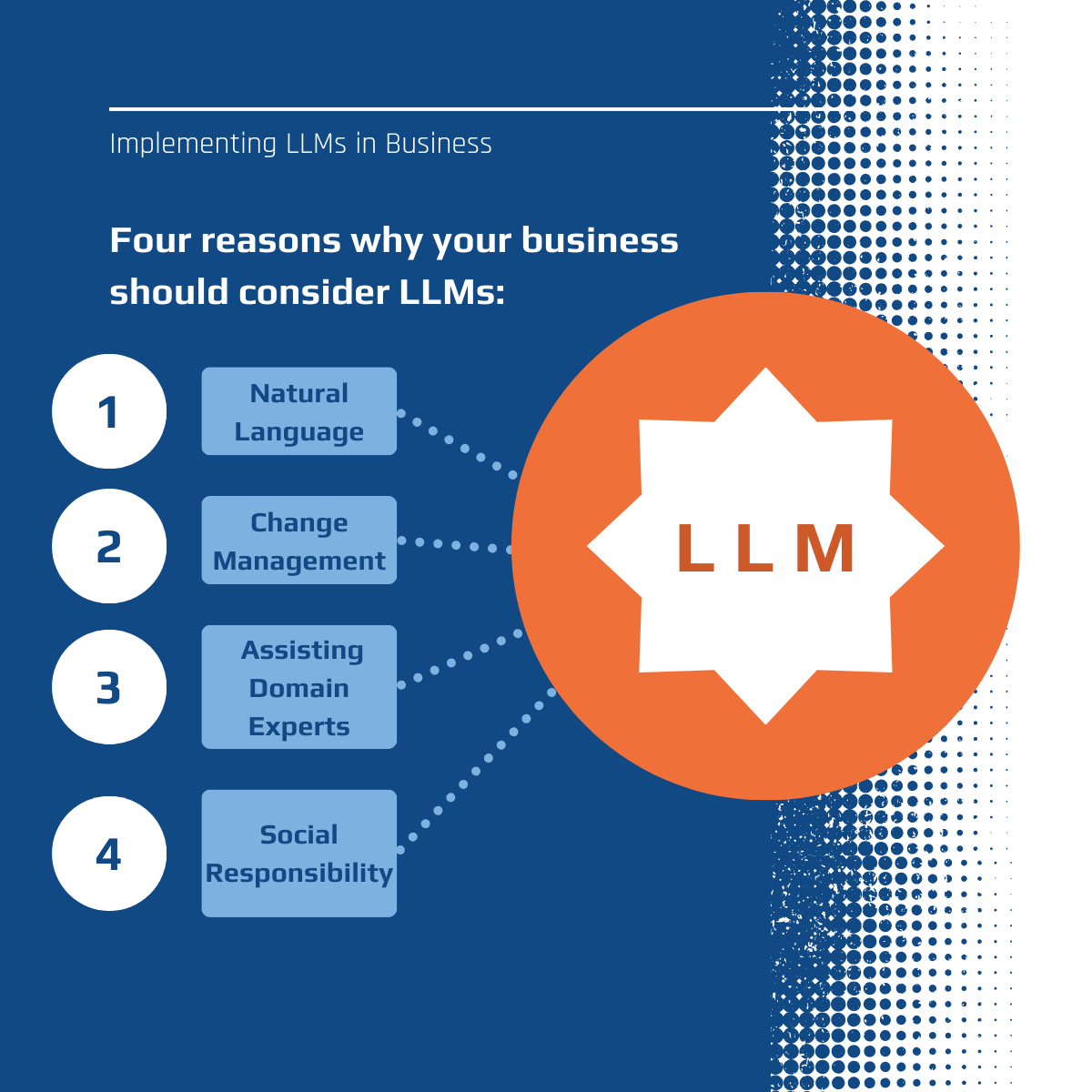Large Language Models (LLM) are developing at an astounding rate. This raises the question: What can LLMs mean for your business? One of the most obvious ways to implement an LLM is as either a client-facing or internal chatbot because of an LLM's ability to assist with complicated tasks using natural language. This blog post discusses four reasons to consider implementing an LLM in your business.

1. The power of natural language and Large Language Models
The user of an LLM does not have to develop any new special skills. This is true of clients and employees. The only skill required is natural language skills. An LLM can help the user solve a technical problem through natural language. For example, an LLM can help employees or clients extract a client’s data from a database without coding. You would not need any domain knowledge to extract the data. LLMs put technical skills in the hands of users, clients, and employees, and they bridge the skills gap. Business and tech have never been easier to integrate.
To avoid possible pitfalls, the LLM your business uses can be personalised. Personalising an LLM for your business will entail a model that sanitises the user query and forces the LLM to act within a specific role and stick to a specific task. Delineating the role defines the domain space in which the LLM has to operate, which limits the risk of the LLM completing a task outside of the expected realm. Defining the role of the LLM also has security benefits. The task is directly linked to the output. Having a clear task limits hallucinations ensures that the output relates to the input, and helps the user solve a problem.
2. Large Language Models and change management
When new technology needs to be implemented in a business, there might be a need to upskill employees; when utilising an LLM application, that barrier is removed. You need little to no training to utilise an LLM successfully, and an LLM application enables you to use natural language queries to elicit solutions for technical problems. These outputs can help you solve business problems and implement other technical advances in your business. LLM applications will most probably not replace your skilled workforce. It will assist them in implementing new technology faster.
3. Large Language Models and domain experts
An LLM should be viewed as a tool that can assist employees. Utilising an LLM can help your domain experts work faster and more reliably. LLMs are especially handy for assisting with your domain experts’ mundane everyday tasks, freeing them up for more complex problems. Consider the process of data cleaning as a use case. Data cleaning is a process in the data science lifecycle, and it entails reworking data from one form to another by, for example, removing missing values and duplicates. Writing the code to clean the data can be a very manual process. An LLM can be tasked to write this code for you, but you will have to be a domain expert to be able to check the code. Even so, it saves a lot of time!
4. Large Language Models, Business and social responsibility
Is using LLMs in business a passing craze, or is it unavoidable for your business to adapt and implement this new technology? Will it become unavoidable for businesses to utilise LLMs? It is not yet possible to say, but what is known is that most companies are taking note and exploring possible use cases for LLMs. As with any new technology, the question isn’t who is willing to implement it first but who is willing to be the first to be wrong.
Consider the development from horse travel to car travel. Cars are a lot faster, but they come with new dangers. The same is true about implementing new technology. Although the benefit most probably outweighs the disadvantages, there are still some disadvantages to consider. One of the benefits, in the South African context, is that LLMs have the potential to put previously expensive services, like financial advice, in the hands of ordinary South Africans and serve an underserved market.
Companies that have the means to do research and development regarding LLM use cases for business should not hesitate. We need large organisations to set up centres of excellence regarding LLM use. Setting the standards for the responsible implementation of this new technology is a current priority.
In conclusion...
With the rate at which LLMs are developing, it might be time for your business to consider researching and developing this new technology. Some reasons to consider implementing an LLM in your business include that no new skills are required to operate an LLM. You do not need to be able to write code to create a user query because an LLM works with natural language. An LLM can help users solve technical problems without learning new skills like mastering new programming languages. LLMs will not replace your domain experts; they are tools that assist your domain experts in working faster to produce more reliable results. Finally, your business might even have a social responsibility to research this new technology. It has the potential to put expensive services in the hands of people who would not otherwise have been able to afford them, and we need trailblazers who pave the way for responsible LLM implementation.
For more information regarding the power of LLMs and how they can be used within your internal or client-facing applications, contact Praelexis AI (here). We are experienced in designing, evaluating, and deploying such LLM-powered applications and would love to be part of your generative AI journey.
Unlock the power of AI-driven solutions and make your business future-fit today! Contact us now to discover how cutting-edge large language models can elevate your company's performance:




